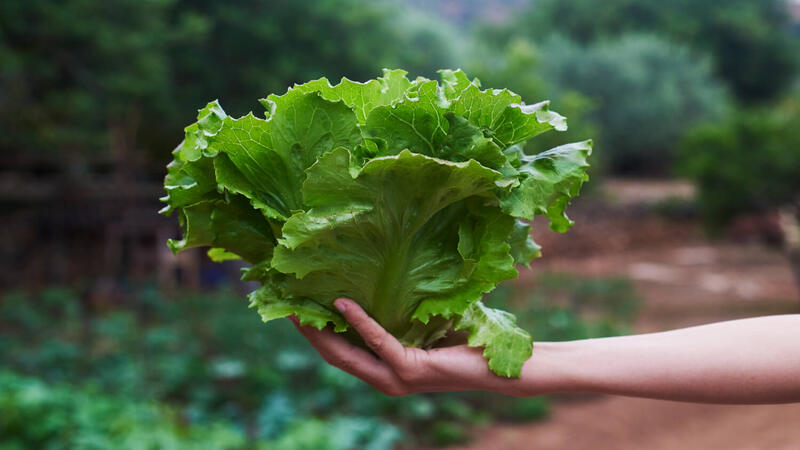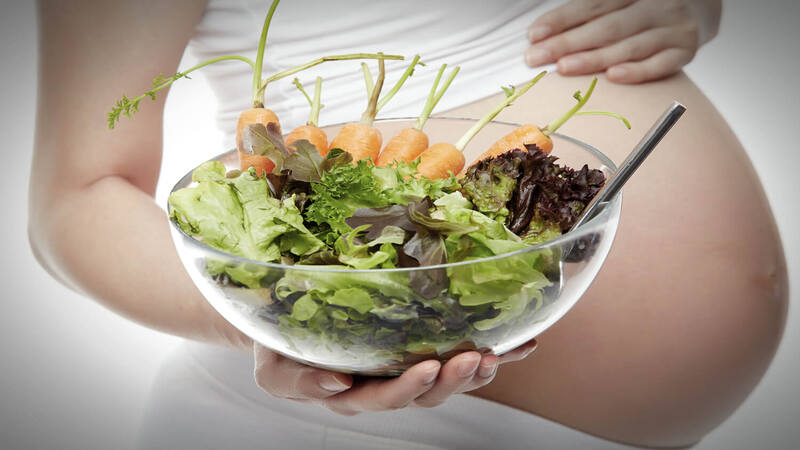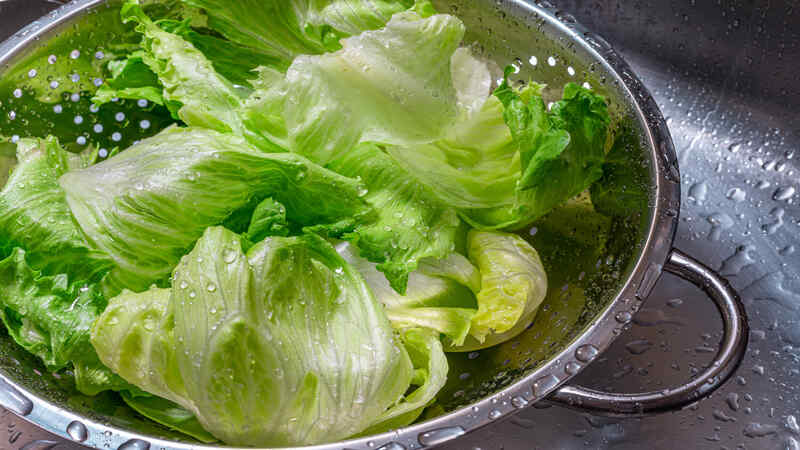 Pregnant? You’d be on the hunt for healthy food! Think healthy and the first thing that comes to your mind is salads. Easy, crunchy and enviably healthy, salads are the in-thing in modern times. But a salad feels incomplete if there is no lettuce in it, even though the likes of kale have taken to the limelight.
Pregnant? You’d be on the hunt for healthy food! Think healthy and the first thing that comes to your mind is salads. Easy, crunchy and enviably healthy, salads are the in-thing in modern times. But a salad feels incomplete if there is no lettuce in it, even though the likes of kale have taken to the limelight.
Lettuce is cool weather, a green leafy vegetable commonly used in salads. It is a source of minerals, vitamins, and dietary fiber. Vitamins and minerals are present in the green leafy parts, whereas the ribs and the spine are rich in dietary fiber.
Video of Lettuce During Pregnancy
What is Lettuce?
Lettuce comes from the daisy family and is a popular leafy vegetable. As a leafy veggie, lettuce is famous for forming the base of salads. In addition to salads, lettuce is often added to soups, wraps, and sandwiches.
Is It Safe To Consume Lettuce During Pregnancy?
Yes, it is safe to eat lettuce during pregnancy. But be sure to thoroughly wash it before eating. If lettuce is not washed before eating, it may contain parasites or bacteria that can cause dangerous illnesses like listeriosis and toxoplasmosis. Be sure to rinse each leaf individually to get rid of pesticides. You can fulfill your craving for food while pregnant by eating lettuce, as well as gain several health benefits.
Types of Lettuce
There are four basic types of lettuce:
- Iceberg
- Butter-head
- Green leaf
- Romaine
Of the above types, Romaine has the highest nutritional value, whereas iceberg has the lowest.
What are the Nutritional Benefits of Eating Lettuce During Pregnancy?

During pregnancy, intake of essential nutrients is very important for both the mother and the fetus. Lettuce provides a host of nutritional benefits such as:
1. Fiber
Fiber helps in preventing constipation, which is a frequent complaint during the pregnancy period. Lettuce is a very good source of dietary fibers. One serve of lettuce provides 5% of the daily suggested fiber.
2. Vitamin K
Lettuce is a good source of vitamin K. Vitamin K from the mother’s body passes through the placenta to the child. Therefore, eating lettuce during pregnancy will directly benefit the child. Vitamin K also helps in blood clotting, thereby, reducing the chances of hemorrhage during delivery.
3. Folic Acid
Adding lettuce to your diet provides you 19% of the daily recommended folic acid. Taking folic acid during pregnancy helps to protect the unborn baby from birth defects such as the cleft palate and also from birth defects of the brain (anencephaly) and the spinal cord (spina bifida). It also helps to prevent anemia during the early stages of pregnancy.
[Read: Folic Acid- The Friend From Day One]
4. Vitamin A
One cup of green lettuce provides 19% of the daily needed vitamin A. Vitamin A plays an important role in the embryonic growth (development of the circulatory, respiratory, and central nervous systems) of your baby.
5. Calcium
One serve of Romaine Lettuce provides 3% of the daily requirement of calcium. If your intake of calcium lessens during pregnancy, your baby (in need of calcium for proper development of bones and teeth) draws it from your bones which will affect your health badly in the near future.
6. Potassium
Lack of potassium may cause leg cramps during pregnancy. It is also an important factor to maintain electrolyte balance during pregnancy. Lettuce provides 8% of the daily requirement of potassium.
7. Iron
One serve of lettuce has 5% of the iron required each day. You need more iron during your pregnancy time, especially during your second and third trimester, because the blood production of your body increases up to 50% thus more hemoglobin is produced, increasing the demand for iron.
8. B-Complex Group of Vitamins
Lettuce is rich in B-complex group of vitamins such as riboflavin (also called vitamin B2), thiamine (also called vitamin B1), and pyridoxine (also known as vitamin B6), each around 7% of the daily requirement.
Thiamine plays a vital role in brain development, bone development, and muscle development in babies. Riboflavin helps in the development of skin. Pyridoxine helps to control morning sickness and also plays an important part in brain development.
[Read: Are Jalapenos Safe During Pregnancy?]
How to Choose the Right Lettuce?
There is an easy technique to remember while choosing lettuce- the darker the lettuce, the better. The color is a good pointer of nutrition. More color indicates more chlorophyll. Vitamin K is found in chlorophyll.
Folic acid, which has an important role in preventing birth defects during pregnancy is also found more in darker lettuce. So, always choose dark-colored lettuce such as Romaine over pale-colored ones such as iceberg. Every time, select fresh and crispy leaves and avoid wilted leaves.
Risks and Precautions When Having Lettuce During Pregnancy

Eating lettuce-rich salads will benefit your health during the period of pregnancy. Before preparing lettuce a few things have to be considered, such as:
1. Thoroughly Wash Lettuce
Intake of raw green salad, especially during the pregnancy period, may expose you to serious health risks. The presence of dirt and traces of pesticides can’t be ruled out. Separate each leaf and examine them carefully.
Throw away crushed or wilted outer leaves. Soak the remaining leaves in cold water for about 5 minutes. You can also add bicarbonate of soda to the water, to be sure to remove the traces of pesticides. Rinse them thoroughly in running cold water.
2. Use Cold Water
Remember to use only cold water for the cleaning procedure. Otherwise, the crispiness which enhances the taste of salad could be lost.
3. Buy Organic Lettuce
Fertilizers, pesticides and chemicals used for cultivation affect the nutritive value of lettuce. Using organic lettuce will help to reduce this risk factor.
Remember, consumption of unwashed greens of any kind can expose pregnant women to a series of health hazards. Always consume a food item that is fresh, hygienic, and in moderation.
[Read: Eating Parsley in Pregnancy]
FAQ’s
1. Can Lettuce Help the Fetus?
Yes, it can. It is rich in vitamin K and folic acid. This can be passed on to the baby too.
2. Is Lettuce Dangerous for Pregnant Women?
If you consume old or rotten lettuce, it can be dangerous. If it contains a lot of pesticides, it can affect both mother and baby. Opt for organic varieties if possible.
3. Can I Eat Raw Lettuce With Salad During Pregnancy?
Raw vegetables should be avoided when pregnant. However, lettuce tastes best when raw and crunchy. So wash it well to remove all dirt and pesticides.
4. Can Lettuce Help Control Weight Gain During Pregnancy?
If you eat it right it can. Overload your salad to satiate pregnancy cravings, may not help. Lettuce has high water content, so it doesn’t add weight.
Read Also: 10 Amazing Benefits of Eating Broccoli During Pregnancy
